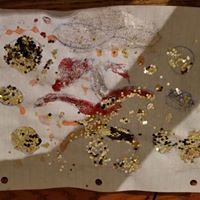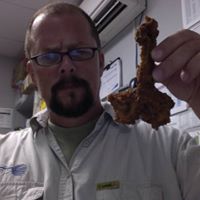Leaderboard
Popular Content
Showing content with the highest reputation on 07/19/2011 in all areas
-
I had the same problem when I first started. A few times I jumped to conclusions, diagnosed the patient, passed it onto the ER, to later have the ER Doctor slap me in the back of the head and demand to know what my problem was (only happened once). I responded to a school for a sports incident. The patient had fainted and came back and was complaining about knee pain. After my initial check and interview, I formulated the opinion that his knee had dislocated, but it appeared to me that it had popped back. I told the school administrators and patient, gave him an ice pack, and transported him to the hospital assuring him that nothing would need to be done and that he was fine. Later the doctor told me that the problem was his kneecap and it WAS dislocated (I guess I missed that in the swelling), and he told me not to tell patients anything unless I was 100% sure. So I recommend using the "it might be" approach. Don't commit yourself unless you're certain. "It might be..." "Sounds like..." "It could be that..." That's what I call passing the buck onto someone who's more qualified to answer their questions.3 points
-
Echoing Shock doc - never tell the patient that you have come up with a diagnosis. It will likely be wrong. Seen it tons of times, patient is told they have A going on and it ends up being B. Always use the Could be, Might be , possibly be level of thinking. Now if the patient is showing a AMI on the 12 lead, or the femur is bent in half, then maybe you can tell em they broke their leg. I never give the patient a diagnosis - as that's not part of my job to diagnose. I can think what it is, put my impression in my report and go from there.2 points
-
As a medic I have to show tolerance to each and every patient I help. In this world we as a society have to show tolerance to almost everything even if we dont agree. If we dont we are racist and many other terms. This was sent to me and I may not agree with it all but in the end it got me thinking of the fact that if I have to be tolerant of others, shouldn't others be tolerant of me? Tolerance I am truly perplexed that so many of my friends are against another mosque being built in Sydney. I think it should be the goal of every Australian to be tolerant. Thus the Mosque should be allowed, in an effort to promote tolerance. That is why I also propose that two nightclubs be opened next door to the mosque, thereby promoting tolerance from within the mosque. We could call one of the clubs, which would be gay, "The Turban Cowboy ", and the other a topless bar called "You Mecca Me Hot." Next door should be a butcher shop that specializes in pork, and adjacent to that an open-pit barbeque pork restaurant, called "Iraq o' Ribs." Across the street there could be a lingerie store called "Victoria Keeps Nothing Secret ", with sexy mannequins in the window modeling the goods. Next door to the lingerie shop there would be room for an adult sex toy shop, "Koranal Knowledge ", its name in flashing neon lights, and on the other side a liquor store called "Morehammered." All of this would encourage the Muslims to demonstrate the tolerance they demand of us, so the mosque problem would be solved.1 point
-
How do you work on improving your assessments? As a relatively new medic, I find myself fighting the urge to jump to conclusions prior to completing a full assessment. Usually I find myself recalling several useful questions or assessment techniques post - call that would have helped to rule in or rule out my field diagnosis. I tend to be correct but would like to be performing thorough assessments on every patient. I also tend to form a field diagnosis way too early in the call, which just exposes me to confirmation bias pitfalls. I've been using a Lippincott Signs and Symptoms guide that has been immensely helpful due to the emphasis on "old school" assessment tools used prior to mass imaging availability (as an example, recently learned about the psoas sign test following transporting 14 y/o m with probable appendicitis). I'd be interested to hear how you all form differentials and bear them in mind throughout the assessment and your general thought processes, as well as how you improve your assessments over time. Feel free to share assessments tips as well, I'm sure there's plenty of cool assessment tips and tricks floating around out there.1 point
-
Interesting points! If the patient is alert and oriented, I tend to offer them several options, then the reasons that I believe one of the options is more likely than the others. I understand your point - however, the reason I attempt to form field diagnoses is because I believe I render better patient care with that as my goal. I don't necessarily tell the patient more than they need to know to feel reassured that they are receiving appropriate care. To me, "field diagnosis" means the underlying condition that I am treating. Obviously, I could screw up and treat a pneumonia patient for CHF or vice versa, but the fact is that we assess the patient to come up with a functional diagnosis so we can treat, even if it is simplified compared to what a physician would determine with the aid of labs and imaging, plus wider range of medical knowledge. I think this is mostly semantics, and textbooks cloud the issue by declaring "only physicians diagnose". Awesome technique, Dwayne. I'm definitely going to be using this. The driving force behind this post was working double medic for 90 days as part of new employment orientation, and watching other medics perform assessments.1 point
-
That was me (minus the Afgan part). I'd come up with an idea, ask questions to validate my idea, then diagnose. I think it's a natural way of thinking for most people (even in non EMS fields). You come up with a first impression, then everything that happens after it validates your impression. You see detectives sometimes do this, repairmen, and your average citizen when they make judgments about people. That's some good advice to ask questions to prove yourself wrong. Not just in EMS, but every aspect of life.1 point
-
When I first got to Afg I was fortunate to work with a bunch of medics, some really good, others just shiteheads, but we all worked in a meat grinder. It was mostly clinical medicine but we each saw 15-30 patients/day, day after day after day. I was able to listen to a gazillion assessments, from all types of providers. One thing I noticed was that it was really common for a medic to ask a few questions, decide s/he knew what was going on and then lead the patient the rest of the way down that one narrow path by asking only the questions that would validate their assumption. I don't think that they did it on purpose most times, but just out of habit. It was evil because doing so not only would often lead them down the wrong path, but because the patient didn't really know what was wrong they were happy and the medic was erroniously led to believe that he was a rockstar because it looked like he was right on his first guess every time. I hated that... So, understanding that I'm not better than the other medics and worse than some and thus no less likely to fall into the same traps I developed a plan, that turned into a habit and now is just second nature. It's really pretty easy. Begin asking questions centered on the apparent issue, then focus your questions based on the answers until you are confident that you are on the right path, and then begin mixing in questions that are almost certain to derail you if you are on the wrong path. Know what I mean? An oustanding example is being dispatched for 'drunkenness.' Mr. Jones, have you had anything to drink today? Fuck yeah! A quart of tequila! (Wife appears drunk also, both smell of tequila, you know the scene) Skin flushed/greasy, a little tachy at 118, B/P slightly elevated, speech slurred and irritated, zipper down. No question that this is a drunk. So now prove that he's not. If you can, then he's more than drunk and you can congratulate yourself for being an above average medic and patient advocate. If you can't, then he is what he appears to be, at least as can be discovered at our level of care and you've done your job and should feel really good about that. Mr. Jones, do you have any pain? Nothing hurts but my fucking legs...and they are always hurting me! Do you mind if I take a look at your legs real quick? Will just take a second... You pull up his pants legs and see that his ankles and lower legs are swollen..the skin tight and the skin condition dry, flaky and bruised looking....(Yeah, I'm not going to take all day to turn this into a diabetes/CHF catch, but you get the point.) I think most times with any significantly ill/injured patient you will think of questions that you'd wished you'd asked. Just the fact that you're thinking of your patients after the call bodes well for you as a provider in my opinion. But just like drugs...Gather symptoms until they lead you somewhere, not the other way around, and then when you get where you're going, try and prove that you're lost. If you can't, then you're usually golden, if you can, then you've discovered that you're off in the ditch and need to start asking more questions. Either way is really good...Though of course, sometimes, we're just gonna screw the pooch despite our best efforts. Super over simplified of course, but your post makes it obvious that you're plenty smart and don't need to be spoon fed, so I'm sure you get it. Great question man...it's good to have you here! Dwayne1 point
-
Heres an opinion from some bloke half way around the world, who has never had miltary anything service who doesn't know what is in EMTB but has some of the AAOS text books for it... Seriously, the EMTB advice is the best advice here, think of it as an uber first aid course. I suspect that one of the things you will andoubtedly get out of doing it, especially doing ride time is just how much garbage in first aid kits is just there to look shiny and is really pointless crap. More of the basic stuff and less of the fancier crap will do you well, also, a couple of rolls of duct tape. You dont really need splints, eye patches, ten different sizes of tape or safety pins or multiple sizes of polyamps of saline or whatever diffent sizes of sticking plaster or whatever else they come with is just taking up space. You'd be surpised much you dont actually need or use, and how much if it can be improvised (dislocated my knee a few years back, splinted it with a Pizza Box!) Thirdly, talk to your Doc about having some courses anti-b's stored in it, and OTC analgesia, stuff that will keep and last a long time. And bulk water sterlisation/storage (but i suspect you already know this) So long as you have boiling water, you will be fine. Shit, most of that is already in my pantry!1 point
-
Honestly mate, my performance got better and my managemnt greatly improved when i stopped trying to come up with a provisional diagnosis for every patient. After a year or so i figured tha sometimes (most of the time?) My real purpose was to collect good information for the hospital and quite often treat based on potential rather than identified illness/inury. COnsequently i ask more question and do more interventions (within reason i hope!) because i actually started identifying a lot more issues! It also helped that i formulated an acronym that covered my own "clinical approach" rather than trying to digest a pre fabricated method for doing things. Incidently, it was an expansion on the method i used for case studies at uni. DAPOCAT is what i use, when its expanded it looks like this. Danger, Response, Airway, Breathing, Bleeding (life threat), Circulation, Compressions ?, C-spine Apply Defib if needed Posture Opening assessment (nose to toes) Clinical assessment : Various cronyms fit here, SAMPLE, PQRST, DOLOR etc, whatever your local vernacular is. We would do what we call perfusion status assessment, respiratory status assessment (PSA, RSA)to fill in the rest Apply apropriate CPG/CPG's Transport and re-evaluate. Its a bit of a mess, but becuase it's mine and i thought it up, it works for me.1 point
-
Funny thing... none of the critical patients call me a wanker when I'm SAVING THEIR LIVES! I'm on a local outreach's group first aid team, so I have my own AED (they helped chip in for it). And no, I'm not a police officer... but where I live, the nearest police officer may be twenty minutes away (if he responds code 3), so the OC and handcuffs are a must. Scene safety is something we don't like to take lightly.-1 points
-
It's a fact that a majority of scenes start out safe but end up deadly. And if the scene becomes threatening, you'll be thankful when I'm there with my gear and 100+ hours of combat training. We allow OC and TASERS in the car where I live. We even allow rifles without any sort of license whatsoever. We're hicks, though.-1 points
-
On my duty belt/person: Gloves - Latex and Nitrile Shears - by Mabis Flashlights - penlight and Pelican tactical light Littman III Stethoscope Handcuffs - S&W Model 100 CPR/BVM Hybrid Mask Pepper spray - Fox Labs 5.3 million SHU Radio - dept issued (with my own ear piece and shoulder mic) Business Cards/Certifications (on a strap around my neck) Cell phone EPI Pen Flip Knife (in a boot holster) Off Duty (in my Nissan): AED - by Phillips Assorted First Aid Kit (gauze, bandages, antiseptic, basic stuff) TASER - X2 with spare cartridge Pepper Spray - another bottle of Fox Labs 5.3 million SHU, also a can of Streetwise 2 million SHU (but 17% for a longer sting) CPR Mask Littmann I Stethoscope I'm curious to see what other people carry. post your lists.-1 points



